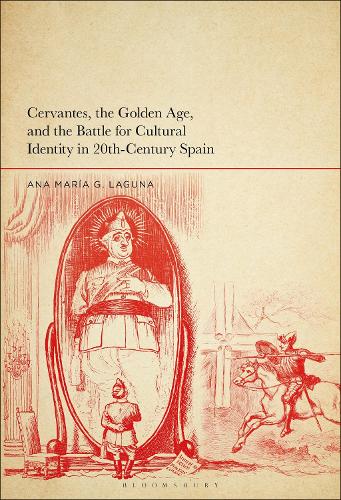
Cervantes, the Golden Age, and the Battle for Cultural Identity in 20th-Century Spain
(Hardback)
Available Formats
Publishing Details
Cervantes, the Golden Age, and the Battle for Cultural Identity in 20th-Century Spain
By (Author) Professor or Dr. Ana Mara G. Laguna
Bloomsbury Publishing PLC
Bloomsbury Academic USA
21st October 2021
United States
Classifications
Tertiary Education
Non Fiction
Literary studies: fiction, novelists and prose writers
History and Archaeology
860.9
Physical Properties
Hardback
256
Width 152mm, Height 229mm
517g
Description
Studies that connect the Spanish 17th and 20th centuries usually do so through a conservative lens, assuming that the blunt imperialism of the early modern age, endlessly glorified by Francos dictatorship, was a constant in the Spanish imaginary. This book, by contrast, recuperates the thriving, humanistic vision of the Golden Age celebrated by Spanish progressive thinkers, writers, and artists in the decades prior to 1939 and the Francoist Regime. The hybrid, modern stance of the country in the 1920s and early 1930s would uniquely incorporate the literary and political legacies of the Spanish Renaissance into the ambitious design of a forward, democratic future. In exploring the complex understanding of the multifaceted event that is modernity, the life story and literary opus of Miguel de Cervantes (1547-1616) acquires a new significance, given the weight of the author in the poetic and political endeavors of those Spanish left-wing reformists who believed they could shape a new Spanish society. By recovering their progressive dream, buried for almost a century, of incipient and full Spanish modernities, Ana Mara G. Laguna establishes a more balanced understanding of both the modern and early modern periods and casts doubt on the idea of a persistent conservatism in Golden Age literature and studies. This book ultimately serves as a vigorous defense of the canonical as well as the neglected critical traditions that promoted Cervantess humanism in the 20th century.
Reviews
A fascinating exploration of the ideological forces which shaped Golden Age criticism in the 20th century based on the recovery of the voices of Spanish avant-garde intellectuals who were forced into exile after the Spanish Civil War. It builds a vital bridge between the humanism of Cervantes and the progressive ideals embodied in the Second Spanish Republic. * Francis Lough, Emeritus Professor of Hispanic Studies, University of Birmingham, UK, and editor of Hacia la novela nueva: Essays on the Spanish Avant-Garde Novel (2000) *
Ana Mara G. Laguna has produced an exquisite study about the organic relationship between Cervantes studies and the Spanish search for identity in the 20th century. In this must-read book, Laguna evinces that the question of what Cervantes and his work signify has long been correlated to the question of how Spanishness is defined and redefined in Spain and the Americas. * Christina H. Lee, Associate Professor of Spanish and Portuguese, Princeton University, USA *
Lagunas study allows us to contemplate the cultural history of Spain through a new set of lenses that convincingly clear away a legacy of assumptions that have hindered our understanding about the fundamental role of the Spanish Golden Age in the very fabric of Spains idiosyncratic modernity before Francos rule. This is a fundamental work centered on the dialogue between Golden Age imperial Spain and the avant-garde Spanish culture that flourished from the 1920s into the 1930s, a work that auspiciously shifts the frame of discussion. * Steven Hutchinson, Professor Spanish & Portuguese, University of Wisconsin-Madison, USA, and author of Frontier Narratives: Liminal Lives in the Early Modern Mediterranean (2020) *
Author Bio
Ana Mara G. Laguna is Professor of Spanish and Golden Age Literature at Rutgers University-Camden, USA. She is a founding member of the Cervantes Public Project and an Executive Director of the Cervantes Society of America. Her research relates visual and verbal domains, multiple national traditions, and disparate chronologies, focusing on how culture reflects prominent artistic and socio-political anxieties. Her work has been awarded fellowships by the National Endowment for the Humanities, the Program for Cultural Cooperation Between Ministry of Culture of Spain and United States Universities and the Shakespeare Folger Institute. She is the author of Cervantes and the Pictorial Imagination (2009) and co-editor (with John Beusterien) of the collected volume Goodbye Eros: Recasting Forms and Norms of Love in the Age of Cervantes (2020).
